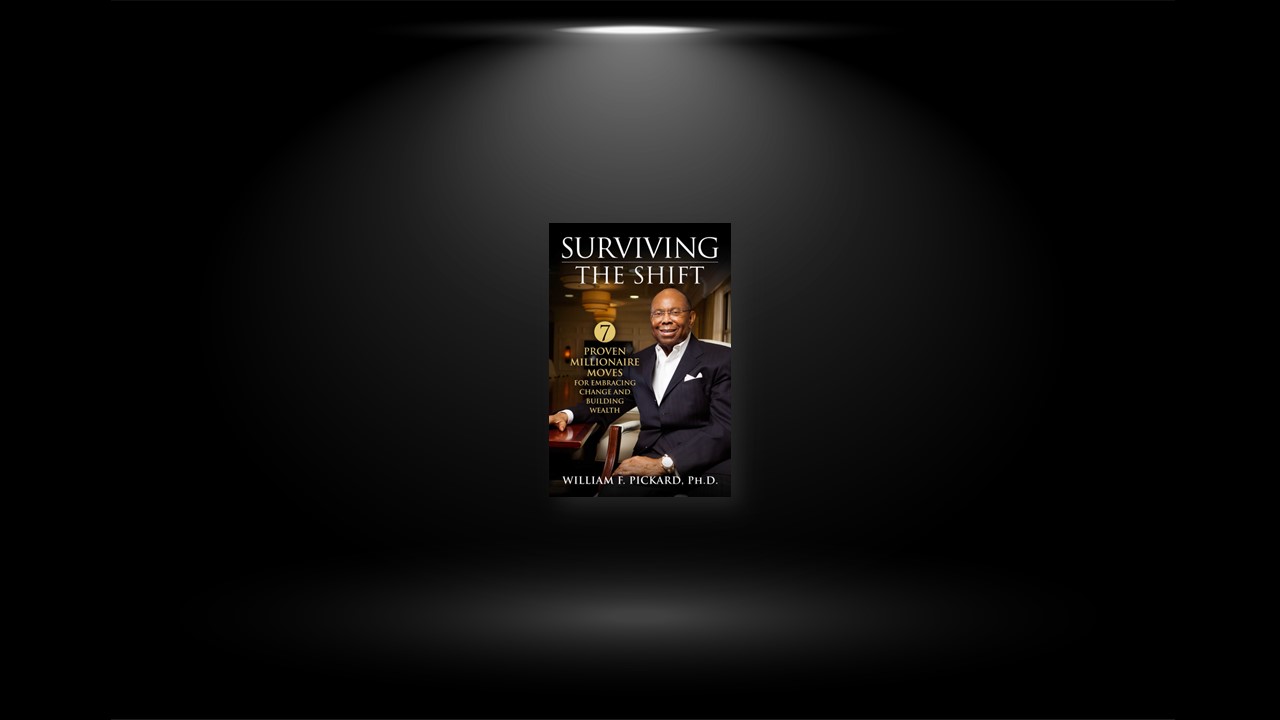Principle 1: Develop Positive Vision and Attitude
Vision is foresight and the ability to sustain an image of something that has not yet manifested. It’s the two-hundred-unit apartment tower you expect to develop. It’s the chain of neighborhood laundromats you sometimes daydream about. It’s the business that grosses $100 million annually and maintains a global clientele. It’s the thing you focus on with the intention of bringing it into existence.
You have to be able to see the perfect credit score; you have to picture yourself walking into the bank and depositing that seven-figure check. You absolutely have to believe it and keep your thoughts aligned with your goal. For instance, you can ask one person, “How are you doing today?” and hear back, “I’m alright,” versus another person’s response, “It’s a great day! I’m glad to be up. I’m going to make something happen!”
That’s where attitude comes into play. Vision and attitude are like yin and yang. The vision you are holding is based on the attitude you have been nourishing. Attitude is the emotion that gives birth to your desires and propels you forward. It’s the perspective that fuels your imagination and enables you to see things today that will transform your business tomorrow. When you become a visionary, you learn to adjust your lens and shift your perceptions, especially the images you have of yourself.
Principle 2: Prepare for Opportunities
It’s all about keeping an open mind. It’s all about digging for gold instead of pointing at obstacles. It’s all about doing what Booker T. Washington used to preach. During his many lectures, he would encourage his audience to “cast down your bucket where you are.” Today that could translate into a pet grooming business, an on-campus manicure service, or a soul food diner near your grandma’s church. Or it might mean scrutinizing something outdated and adding a few modern tweaks.
When Uber and Lyft entered the scene, the transportation business changed overnight. Uber and Lyft are the perfect examples of companies that revolutionized an industry and practically turned it upside down. It’s the largest taxi service in America, yet it doesn’t own a single vehicle.
How can you be in the transportation business and not own any cars? That’s unheard of, isn’t it? What’s Uber’s business model? Use your own car! That’s why cab companies fought so hard to keep ride-sharing services out of big cities. They knew it would put them out of business. Taxicab owners in New York City were paying anywhere from $450,000 to $700,000 for a taxi medallion. Now Uber comes to town, and anyone with a late model car in good working order can pick up people and knock you out of the game. Even with demand down during the COVID-19 pandemic, Uber’s gross revenue reached $21.9 billion in the second quarter of 2021.
Remember that the next time you ask, “Where are the opportunities?” Think about it and then tell yourself, “Proactivity is opportunity’s accountability partner.”
Principle 3: Look for Finance Options Everywhere
Nearly all entrepreneurs start out with no money. Many of them are just as broke as the next person. Yet they achieve their goals anyway. You take one step, and God will take two. That’s another way of saying, “Go forth with your business plans and, sooner or later, the money will appear.” With that said, most start-ups are not financed by banks. Instead, start-ups are funded by a host of alternative sources.
Most of us don’t come from families that can write us a one-million-dollar check and tell us to get out in the world and make our mark. That’s only for the truly privileged and Hollywood. But we have at our fingertips a supreme resource called creativity. Numerous studies have shown that children who grow up in families where there was an entrepreneur are more inclined to become entrepreneurs. If you have this advantage, then build on it. If not, follow the examples set by parents, grandparents, aunts, and uncles who had to borrow from Peter to pay Jamal and juggle what little they had left.
Principle 4: Build Good Relationships
Many of the most successful businesses in the world were the creations of lifelong friends or college classmates. Apple founders Steve Jobs and Steve Wozniak met when Jobs was fifteen or sixteen years old and Wozniak was about twenty or twenty-one, while both were working at a Hewlett-Packard factory. Before Microsoft became a $2 trillion business, Paul Allen and Bill Gates met as teenagers in the late 1960s at Lakeside School in Seattle, when Gates was in eighth grade and Allen was in tenth grade. Likewise, Ben Cohen and Jerry Greenfield met while running around the track in seventh grade. They reunited in New York after school, then moved to Vermont to create the world’s most famous ice cream.
As you and your friends mature, you will begin to make referrals for one another and offer leads to jobs. Possibly, these leads will have a cumulative effect. One friend in a good position will hire one, then another. Along the way, the squad will begin to swap investment ideas and/or make plans to pursue a business partnership. Just like tipping dominos, you will push one another forward.
You have to belong to something, be it a sorority, fraternity, alumni organization, church, community group, or a nonprofit. Get involved. Volunteer. Everyone has a skill or an activity they enjoy. Figure out what that activity is for you. But before you do, make sure you know how to pace yourself and manage your expectations. When you volunteer for political campaigns, don’t expect to become a director the first time around. Stay humble and focused on serving. That’s the real reason you’re there. (Of course, getting in the mix is part of it, too, but service always comes first.)
Principle 5: Choose a Team with the Right Talent and Skill Set
Chief executive officers can’t afford to be naive about the employees they hire or the contractors that provide the services they outsource. These individuals and entities are key to a successful operation. They are not only responsible for production but are often the first or last line of defense between you and your patrons. They are your company’s image, attitude, and voice. In essence, they fall into three categories: Finders, Minders, and Grinders.
- Finders: A Finder is someone charged with business development. This is the person who is actively identifying prospective new deals, whether it’s at the local chamber of commerce, country and golf clubs, alumni associations, and anywhere potential dealmakers—and deals—might be present.
- Minders: Those in C-suite roles, management, or operations are the Minders: CEO, CFO, CMO, CTO, the chief talent acquisition person, and others, many of whom have MBAs or legal degrees. The Minders collaborate to evaluate and manage a newly identified opportunity and determine whether it should evolve into a business deal.
- Grinders: Grinders are manufacturing or support staff who are tasked, ideally, with working together in a positive environment to produce products and services. They’re the guys and gals on the assembly lines, in warehouses filling orders, or the young people at the front counter and in the kitchen of your restaurant.
The success of any business depends on these three interconnected roles. If they aren’t filled properly, you can forget about your impeccable credentials or impressive work ethic. No matter how accomplished you are or how good you might be at your craft, it’s the people who work for you and with you who will have lasting impacts.
Principle 6: Do Not Overreact to Failure
failure is something that simply comes with entrepreneurship territory. It’s like gravity. Sometimes you fall and, well, falling is natural. All you have to do is get up. When you do, you’ll be comforted by the awareness that your situation wasn’t so bad after all. In fact, you just joined a pretty impressive club.
Did you know that Oprah Winfrey was fired from one of her first TV news reporter jobs because she wasn’t the “right fit”? Then there’s Abraham Lincoln. Before he made it to the White House, he lost seven elections and struck out in business three times. Yet they were not deterred. Their names are well known today because they understood one of life’s most valuable lessons: if at first you don’t succeed, you’re about average.
Winfrey and Lincoln knew that failure is not the exception; it is the rule. They didn’t allow their careers to be destroyed or their drive to be dampened by that dreaded little life episode that eventually knocks on everyone’s door. They realized that failure is as American as apple pie and Chevrolet. It is not a death sentence. It is not the enemy, and it is not the last word. There’s a big difference between leaving and quitting. Make no mistake about it: success is the kissing cousin of failure. The people on top are there because they refused to remain on the bottom.
Principle 7: Cultivate Strong Faith
It’s difficult to build a business without a formidable belief system. As an entrepreneur, you absolutely must have faith in something—faith when things are picture-perfect and faith when it all goes haywire.
Take FedEx founder Fred Smith, for instance. While he was still a student at Yale University, Smith had already devised his plan to revolutionize the package delivery industry. But when he wrote about it in a term paper, his professor scoffed at the idea and graded the assignment a measly C. Smith wasn’t swayed. In the early 1970s, he launched FedEx, the first company of its kind to rely on vans, airplanes, and posting stations to rush parcels to homes and businesses across the country overnight. The company took off like a rocket and then, suddenly, began to fizzle. A few months later, Smith found himself with a $24,000 fuel debt and only $5,000 in his company’s bank account.
Now, this is where the situation gets tricky. Smith had something known as fervor. He had audacity. He was filled with imagination, tenacity, and a quiet little passion called hope. Put them all together and they spell FAITH. The young entrepreneur flew to Las Vegas with his last $5,000 and gambled it all on the blackjack table. On Monday morning, he returned to his office with $27,000 in winnings—enough to pay the fuel bill and prevent his business from going bankrupt.
The lesson to be learned here is that there is nothing stronger or more amazing than the power of intention. When you intend to make something happen, your mind is made up, and a made-up mind has often been defined as one of the most potent forces in the universe. In the jargon of contemporary positive thinking, this means that where thought goes, a whole lot of energy flows. You become magnetized to your goal because you firmly believe in it.


